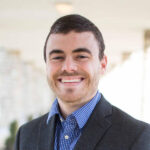Fusion challenges traditional ‘gap year’ allowing students to redeem it for Kingdom purposes

As universities struggle to plan for the new school year in the middle of a pandemic, one college has found a solution that helps students navigate uncertain times. Spurgeon College’s Fusion “gap year” program isn’t what you think.
For an increasingly growing number of American students, taking a year off after high school to contemplate next steps, make important life decisions, or traveling the world has become increasingly popular. However, the practice has its drawbacks with some students finding they’ve just wasted a year with nothing to show for it.

For students not inclined to jump immediately into college life, Erik Odegard, director of Fusion at Spurgeon, would encourage them to consider a program that provides all the elements of a traditional “gap year,” but offers missions experience, ministry training, and relationship building, all while working toward a bachelor’s degree.
Odegard said he understands the current cultural moment for students considering higher education. He noted there’s uncertainty about whether colleges will open in the fall or about how they’re responding to the COVID-19 pandemic. Many families, he said, are saying, “Well, maybe this just isn’t the right year for you to start college.”
This is where Fusion meets a huge need, Odegard said of the program and college which are based in Kansas City, Mo. “There’s absolutely no uncertainty surrounding the fact that Spurgeon College will be open this fall. It will be, and that means Fusion will carry on with its mission as well.
And for students concerned about the reported second wave of the Coronavirus affecting schools’ operations, Odegard notes how Spurgeon College has implemented Residential Plus—an educational model that allows a seamless transition from the classroom to live online interaction between students and faculty in the event further disruption by COVID-19.
“Students can be 100-percent confident in completing a full school year at Spurgeon College,” Odegard said. “They don’t have to be concerned that their plans will be foiled. Essentially, what we’re saying is, ‘Don’t waste a year; don’t take a year off from college; we’ve got a way for you to redeem this year for Kingdom purposes.’”
But exactly how does Fusion supplant the gap year ideology? Foremost, Odegard explained, is that Fusion is a one-year program within a four-year degree. As students are experiencing all Fusion has to offer, they are concurrently earning credits toward college graduation with a B.A. in intercultural studies degree.
Secondly, Odegard said Fusion meets the predominant goals students typically look to accomplish by taking a gap year. This includes four ingredients: experiential learning, making a difference, authentic community, and travel/adventure.
Odegard highly encourages students to get their hands dirty pursuing interests and learning through experience, and “Fusion’s definitely a ‘get your hands dirty’ kind of program. Our training consists of very hands-on learning and a lot of simulation—like traveling around the U.S. before traveling internationally. Then, ultimately, if you want to be a missionary, we’re preparing you to go overseas for three months, where you’ll partner in gospel ministry alongside missionaries. That’s about as hands-on as you can get.”
Fusion also offers the opportunity for students to make a difference in the world. There are many ways in life to do this, Odegard shared, but he posits that if one desires to do this, do it by “investing in something with an eternal difference. We’ve got the greatest cause in all the world—making disciples of all nations.”
For students wondering where in life they fit in, Odegard shared that Fusion offers deep, authentic community. Fusion students do life in small groups—together living in the dorm, taking classes, ministering around Kansas City, and traveling the world. They also worship together in local churches learning what true church membership looks like.
Lastly, Odegard explained that students are seeking adventure and desire to travel the U.S. and the world in search of it. This can be accomplished through Fusion because at the end of their year of training and studies, students go abroad and serve in ministry alongside International Mission Board missionaries.
This work isn’t done in garden spots; rather, “We leverage that desire to go to the fringes and places where few people have gone. We leverage that adventurous desire for the sake of the gospel and to establish and strengthen churches as we go.”
Luba Eady, an Accelerate program student at Spurgeon College, who’s pursuing a B.A. in intercultural studies and M.Div. in church planting, has taken both paths.
Eady took a gap year after graduating high school in 2018, and then joined Fusion in 2019. She explained that upon graduation she felt called into ministry, but she was unsure which field. As a result, she decided to take a year off from school to find clarity about which area of ministry to pursue.
After her gap year, Eady enrolled at Spurgeon College because Fusion offered her hands-on training that would prepare her for a lifetime of missions. She admitted, “I wanted to be challenged inside and outside a classroom setting, and Fusion provided the hands-on training opportunities.”
Eady shared that the biggest difference between a traditional gap year and her Fusion experience was how Fusion training equipped her for most any circumstance while also learning how to make disciples, who make disciples.
“There were multiple times where training that candidates receive in Fusion would have been handy for me while I was overseas on my gap year,” Eady said. “The training that’s received in Fusion doesn’t only prepare their candidates for a moment, but for a lifetime.”
If she had to do it all again, Eady said she might opt for a different route, saying, “In hindsight, after going on my gap year and then going to Fusion, I wouldn’t choose the same path. Instead, I would jump straight into Fusion after high school because I felt more prepared through Fusion for a lifetime of missions than I did through the training I received on my gap year.”
Ultimately, Odegard believes many students, like Eady, who take gap years wind up regretting the decision. “I think often, for a number of students, they’ll get later on in their degree and wish they’d gotten to school sooner because people their age will already be graduating. They’ll wish they’d already made that progress, and perhaps they’ll wish they would’ve used their gap year more effectively.
“Again, let me encourage students to not waste a valuable year of their life. Fusion meets the four ingredients they desire in a gap year, and it makes the most of their efforts for Kingdom purposes. I don’t believe anyone regrets progress toward their degree or getting to the mission field sooner. Fusion can help you accomplish that.”
To learn more about Fusion at Spurgeon College, visit https://spurgeoncollege.com/academics/fusion/.






